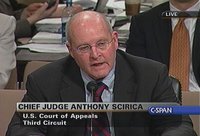 It takes a lot of nerve, let me tell you. Sorry, I'm getting ahead of myself again. You see, Plaintiffs' counsel in the AT&T securities class action reviewed more than 4 1/2 million pages of documents, took eighty depos, and even went to trial for eight days (back in October 2004) before securing a $100 million settlement. And after all that (and that's just scratching the surface I'm sure), some objectors come in at the end complaining that counsel's fee request of 21.25% was too high. Too high? Are these people serious? In a country where most contingent attorneys routinely charge 1/3 (and in some jurisdictions 40% if the case goes to trial), 21.25% is certainly reasonable. And when you factor in four years of intense work with no guarantee of any payment, well, all-right I'll stop.
It takes a lot of nerve, let me tell you. Sorry, I'm getting ahead of myself again. You see, Plaintiffs' counsel in the AT&T securities class action reviewed more than 4 1/2 million pages of documents, took eighty depos, and even went to trial for eight days (back in October 2004) before securing a $100 million settlement. And after all that (and that's just scratching the surface I'm sure), some objectors come in at the end complaining that counsel's fee request of 21.25% was too high. Too high? Are these people serious? In a country where most contingent attorneys routinely charge 1/3 (and in some jurisdictions 40% if the case goes to trial), 21.25% is certainly reasonable. And when you factor in four years of intense work with no guarantee of any payment, well, all-right I'll stop.So anyway, after being rejected by the District Court, the objectors appealed, “contending the award of attorneys' fees and expenses is unfair and unreasonable because (1) it is excessive, (2) it employs a sliding scale that provides for the fee percentage to increase rather than decrease as the settlement amount increases, and (3) it provides for payment of the full amount of attorneys' fees before class members will receive payment. Objectors ask that fees be reduced to 15% of the settlement fund, in addition to requested costs and expenses, and that the pay-out be staged, with the final installment withheld until class members have been paid.”
Well, the Third Circuit rejected the objectors on every point, with perhaps the most interesting part saying that “the District Court did not abuse its discretion in concluding the sliding scale was fair and reasonable in light of the size of the settlement fund, the difficulty and length of the litigation, and the fact that all benefits accruing to class members are properly credited to the efforts of class counsel.”
You can enjoy In re AT&T, issued July 20, 2006, right here. I sure did.
Nugget: “The lodestar cross-check, while useful, should not displace a district court’s primary reliance on the percentage-of-recovery method.”

No comments:
Post a Comment